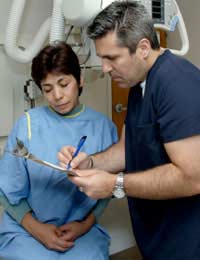All About Female Sterilisation

For women who have already had a family and don’t want to have any further pregnancies or those who are certain they do not want a family at all, sterilisation provides a permanent method of ensuring a pregnancy does not happen.
It is a very effective method of birth control and is 99% effective; very rarely is there a pregnancy following this procedure.Although it can be received on the NHS, sterilisations are becoming less easily obtained this way as there are so many other methods of effective birth control that are not so expensive or so permanent.
How is a Sterilisation Carried Out?
Performed under a general anaesthetic, and often as a day-patient, a sterilisation involves a surgeon occluding the fallopian tubes using devices such as clips, ties or bands.This prevents the egg that is released from the ovary travelling into the uterus for sterilisation by the sperm.It is often performed as key-hole surgery using a telescope inserted just at the navel and another instrument inserted in the abdomen. The image is transmitted onto a television screen enabling the surgeon to visualise the anatomy and place the clips accordingly.
The wounds will be closed using either absorbable sutures or skin glue and should be kept clean and dry until completed healed.If the surgeon thinks it is not possible to perform the operation using key-hole surgery, a small incision in the lower abdomen will be made to gain access to the tubes.
Occasionally a sterilisation may be performed as a secondary procedure to a Caesarean section. This will depend on the surgeon and the individual’s personal circumstance. In this case, the procedure is carried out as an ‘open’ operation as the surgeon already has access to the abdominal cavity. In this procedure a portion of the tube is removed and the ends are tied off.
Although it is not a legal requirement to have consent from the partner, most doctors prefer both partners to have fully discussed the procedure and understand all of the implications.A sterilisation does not affect sex drive or periods, although initially following the procedure bleeding may be slightly heavier than normal.
Can it be Reversed?
Reversal of sterilisation is a very complicated procedure offering no guarantee of success.In order to restore the tubes back to their original function, the occluding device must be removed along with the damaged section of the fallopian tube which must then be stitched back together again.The trauma caused to the tube causes welling to the site which can cause the tube to become blocked. The width of the inside of the fallopian tube is very narrow making the procedure very difficult.It is possible in a small number of cases but again a successful subsequent pregnancy is not guaranteed.
Most NHS organisations do not offer the reversal procedure, but if you are fortunate enough to be considered, the waiting list can sometimes be quite lengthy.
Age Limitations
Each doctor and NHS Trust will assess a woman individually on whether a sterilisation is the right choice for her. The minimum age limit is often considered to be 25 years, but individual cases may present exceptional circumstances.A female sterilisation is considered a permanent procedure and one that takes a lot of thought and consideration.The decision should not be made quickly and a thorough assessment by the doctor should be carried out to ensure this is the right choice for each patient.


Re: Tummy Tucks Explained
I have been living with my stretch mark scars from pregnancy for 7-8 years, I had my first adorable son when I was 16. I believe that’s why…
Re: What is Squamous Metaplasia?
Sir/ Madam Rcently i went for Anti Mullenrian Hormone Test and the report says metaplastic squamous cells seen . what is this…
Re: Benefits Of Evening Primrose Oil
Please I have been trying to conceive for a while, but to no avail I was told to work on my hormonal imbalance, that is why I…
Re: All About Varicose Veins
What a great article! I can tell you really care about what you are writing about, which is a rare thing these days. Thank you for…
Re: What is Squamous Metaplasia?
Happy - Your Question:My smear show squamous metaplasia and reactive cellular change with inflammation.what it means??
Re: What is Squamous Metaplasia?
My smear show squamous metaplasia and reactive cellular change with inflammation....what it means??
Re: What is Squamous Metaplasia?
Genie - Your Question:I undergone D&c last Jan. 6 and my histopath result was Chronic Cervicitis with squamous metaplasia. I had…
Re: What is Squamous Metaplasia?
I undergone D&c last Jan. 6 and my histopath result was Chronic Cervicitis with squamous metaplasia. I had on and off very light…
Re: What is Squamous Metaplasia?
My biopsy report says squamous metaplasia...what is the meaning?
Re: What is Squamous Metaplasia?
I just recently had my biopsy result from a liquid-based pap smear test & the result is: acute & chronic cervicitis with squamous…